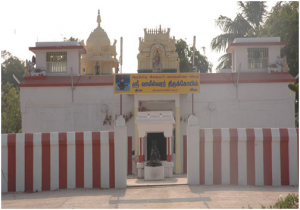Presiding deity Sri Valeeswarar graces in the form of Swyambulinga facing West.
Devotees pray to Lord seeking release from sins, for wisdom and
intelligence, and remedy from the effects Saturn aspects.
Married women and pregnant women offer bangles to Mother
before they wear them. They believe the prayer would reward them child boon and
safe delivery of the child. They also pray to the mother for relief of
Balarishta doshas of Children. Balarishta (Bala-children, arishta-illness) is
an adverse effect on the new borns according to planetary situations at the
time of birth lasting for some years according to astrology.
Koyyamalar Nather: When the monkey king Vali came to
worship the Lord, he did not want to pick the flowers by hand but shook the
tree making the flowers fall on the Lord. Koyya-not picked, Malar-flowers. As
the Lord was worshipped with such direct flowers, He got the name Koyyamalar
Nathar. Sugarcane juice is used for abhishek in the belief that our life would
be as sweet as sugarcane. It is also said that birds and animals having just
five senses also worshipped Lord Valeeswara and gained six senses.
Mother with bangles: Mother Irayarvalai Ammai graces
from a separate shrine facing west. Vali, Indira and Yama the God of Death
worshiped Mother before worshipping the Lord seeking her recommendation to
Lord to grace them. Valai means yielding in this context. That the Mother
yields to the devotees, brought Her the name Irayar Valai Ammai. Saint
Ganasambandar had praised the Mother in his hymns.Valai also means bangles. Married and pregnant women offer
the bangles to the Mother before they wear them hoping that they will be
blessed with children and their deliveries would be safe.
Salvation land: Yama the God of Death was in the
form of a crow before worshipping Lord Shiva, scratched the land and made a
spring, bathed and worshipped the Lord then. The spring was made in the shape
of a new moon in the semicircle form surrounding the temple on three sides
while the Lord is seated on a rock on the plain side. The spring is called
Kakkaimadu theertham and Vayasaidmadu theertham. (Kakkai in Tamil and Vayasam
in Sanskrit means crow). Yama is the authority of Planet Saturn. Those
seeking relief from adverse aspects of this planet, worship Lord Shiva.
Saint Gnanasambander mentions this
temple as Kuranganilmuttam and Paravavahai Veedu, meaning that the devotee is
liberated from the cycle of births and deaths.
The temple is praised in the hymns of "Gnansambandar Thevaram"He Lord Shiva has the trident, has the sacred ash on Him He caused the death of
God of Death He is my Father with beautiful long hair smelling sweet Graces
from Kuranganilmuttam surrounded by fragrant gardens. This is the sixth temple
on the banks of Cauvery in Thondai Mandalam region praised in Thevaram hymns.
Festivals celebrated in the temple:
Lakhadeepam (one lakh lamps) in
Tirukarthikai (November-December)
Shivarathri and Annabishekam in Masi (February-March)
The rays of Sun fall on the Lord on certain days in the month ofChithirai (April-May). The temple is situated on the southern bank of Palaru
river.
There are sculptures of the three on the pillars of the temple
depicting their worships.
Do:
- Do pray your Ishta Devata before pilgrimage to Temple.
- Do contact Temple Devasthanam information centre for enquiry, temple information and for Pooja details etc.
- Do reserve your travel and accommodation at Temple well in advance.
- Do bath and wear clean clothes before you enter the temple.
- Do concentrate on God and Goddess inside the temple.
- Do maintain silence and recite Om Namahsivaya or your Istamantram to yourself inside the temple.
- Do observe ancient custom and traditions while in Temple.
- Do respect religious sentiments at Temple.
- Do deposit your offerings in the hundi only.
Don't s:
- Do not come to Temple for any purpose other than worshipping of God and Goddess.
- Do not smoke at Temple.
- Do not consume alcoholic drinks at Temple.
- Do not eat non-vegetarian food in the Kshetram.
- Do not approach mediators for quick Darshanam. It may cause inconvenient to others.
- Do not carry any weapon inside the temple.
- Do not wear any head guards like helmets, caps, turbans and hats inside the temple premises.
- Do not perform Sastanga Pranama inside the Sanctum Sanctorum.
- Do not take much time while performing Sparsa Darshanam to God in Garbhagriha.
- Do not buy spurious prasadams from street vendors.
- Do not encourage beggars at Temple.
- Do not spit or create nuisance in the premises of the temple.
